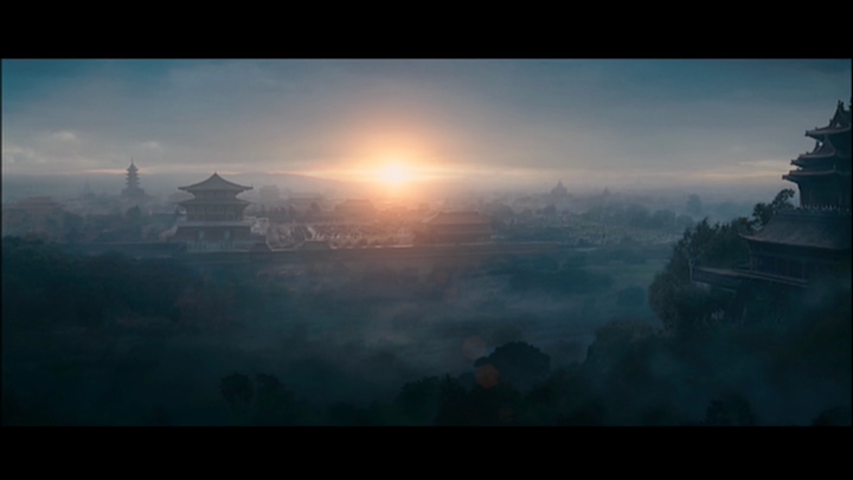 This review is x-posted to Ancient Worlds
This review is x-posted to Ancient WorldsNote: This review is based on the cut released throughout Asia (280 minutes in total) and not on the "International Cut" (one movie, 148 minutes - I still need to be explained that one o_0)
In 208 AD, the cunning and power-hungry Prime Minister Cao Cao (Zhang Fengyi) convinces his young Emperor Xian of the Eastern Han Dynasty that they should attack Liu Bei (You Yong), a warlord in the South, to prevent him from, supposedly, rebelling against the Emperor's central power. Liu Bei, in a bid to protect his people, leads them into exodus before the rapid progress of the much stronger armies of Cao Cao. A battle takes place in order to hold the latter off long enough for the population to reach safety
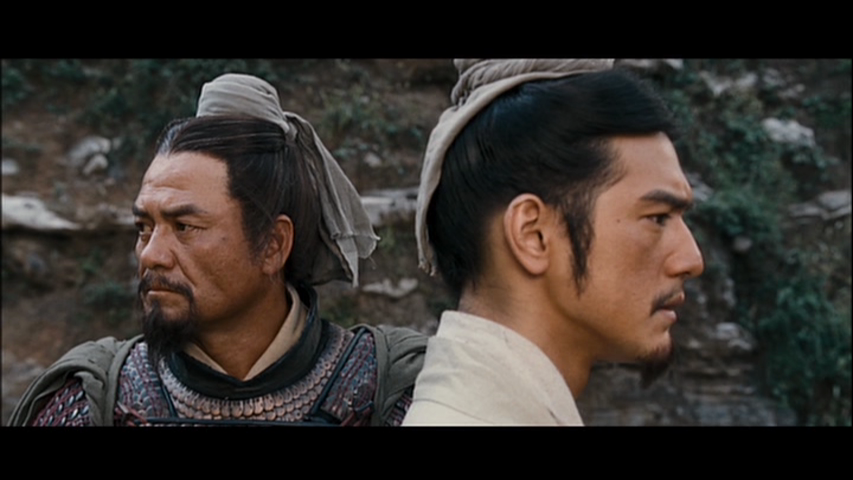 Liu Bei's strategist and advisor Zhuge Liang (Takeshi Kaneshiro) convinces his Lord to seek alliance with their neighbor Sun Quan (Chang Chen), himself torn between surrendering and fighting against Cao Cao. Zhuge Liang, conscious of Sun Quan's dilemna, looks for support in Sun Quan's Viceroy and military strategist, Zhou Yu (Tony Leung Chiu-Wai) who, alongside Sun Quan's younger sister Sun Shangsiang (Zhao Wei, often referred to as Vicki Zhao) advocates resistance to Sun Quan. Having reached an epiphany after a tiger hunt, Sun Quan joins forces with Liu Bei: their 50,000 troops are about to clash with the formidable 800,000 men army of Cao Cao at Red Cliff, near to the Yangtze River, in a battle that will decide the fate of many....
Liu Bei's strategist and advisor Zhuge Liang (Takeshi Kaneshiro) convinces his Lord to seek alliance with their neighbor Sun Quan (Chang Chen), himself torn between surrendering and fighting against Cao Cao. Zhuge Liang, conscious of Sun Quan's dilemna, looks for support in Sun Quan's Viceroy and military strategist, Zhou Yu (Tony Leung Chiu-Wai) who, alongside Sun Quan's younger sister Sun Shangsiang (Zhao Wei, often referred to as Vicki Zhao) advocates resistance to Sun Quan. Having reached an epiphany after a tiger hunt, Sun Quan joins forces with Liu Bei: their 50,000 troops are about to clash with the formidable 800,000 men army of Cao Cao at Red Cliff, near to the Yangtze River, in a battle that will decide the fate of many....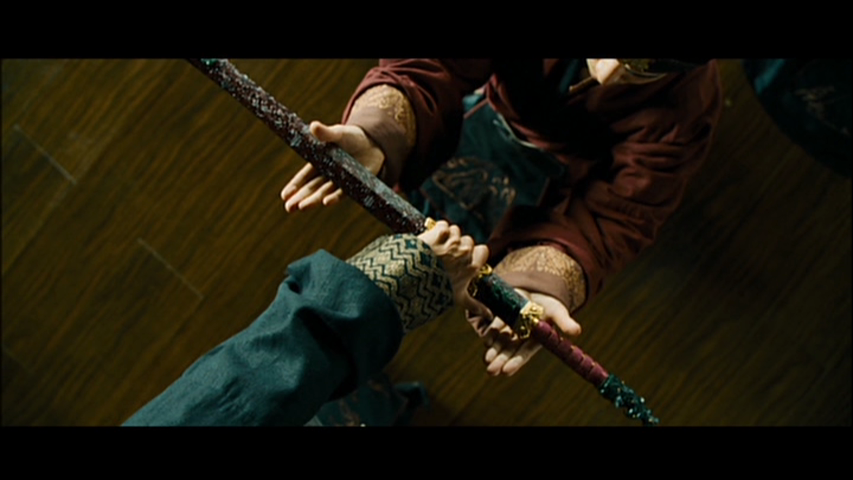 First, don't worry: it's a lot of names, all characters with almost equal importance, and it is true that the Chinese (and many people throughout East Asia) are already familiar with them. Nonetheless, despite being not too familiar with late Han history and having never read "Romance of the Three Kingdoms" (one of the Four Great Classics of Chinese literature which covers the events of Red Cliff) myself, I still didn't find it too hard to remember who was who. Also I want to underline - because reading reviews around the net made it clear it wasn't obvious to all, and the release of different cuts in different countries has made it all the more confusing - that this story, in its original incarnation on which this review is based, is divided into two movies (think Lord of the Rings) and that Red Cliff part 1 is, aptly, only the first 140 minutes covering the story up to the first skirmish at Red Cliff (part two ecompasses most of the actually battle). As a result reviewing these movies is necessarily a difficult job because one needs to keep in mind that each is only part of a whole but must nonetheless do a good enough job of standing on its own. Reviewing Part 1 though is met with more apprehension than Part 2; after all, it is the movie during which the events' background and characters' motivations are laid out, while Part 2 is much more centered on the battle itself, and John Woo, while reknowned for his action sequences, sometimes falters when it comes to actual story-telling more subtle characterization. In many ways, his work on Red Cliff (which marks the director's return to Asia after a long stint in the US) simultaneously confirms our fears while also marking a strong return to form after his rather disappointing output of late and, overall, the latter has a much bigger impact on the quality of the movie than the former
First, don't worry: it's a lot of names, all characters with almost equal importance, and it is true that the Chinese (and many people throughout East Asia) are already familiar with them. Nonetheless, despite being not too familiar with late Han history and having never read "Romance of the Three Kingdoms" (one of the Four Great Classics of Chinese literature which covers the events of Red Cliff) myself, I still didn't find it too hard to remember who was who. Also I want to underline - because reading reviews around the net made it clear it wasn't obvious to all, and the release of different cuts in different countries has made it all the more confusing - that this story, in its original incarnation on which this review is based, is divided into two movies (think Lord of the Rings) and that Red Cliff part 1 is, aptly, only the first 140 minutes covering the story up to the first skirmish at Red Cliff (part two ecompasses most of the actually battle). As a result reviewing these movies is necessarily a difficult job because one needs to keep in mind that each is only part of a whole but must nonetheless do a good enough job of standing on its own. Reviewing Part 1 though is met with more apprehension than Part 2; after all, it is the movie during which the events' background and characters' motivations are laid out, while Part 2 is much more centered on the battle itself, and John Woo, while reknowned for his action sequences, sometimes falters when it comes to actual story-telling more subtle characterization. In many ways, his work on Red Cliff (which marks the director's return to Asia after a long stint in the US) simultaneously confirms our fears while also marking a strong return to form after his rather disappointing output of late and, overall, the latter has a much bigger impact on the quality of the movie than the former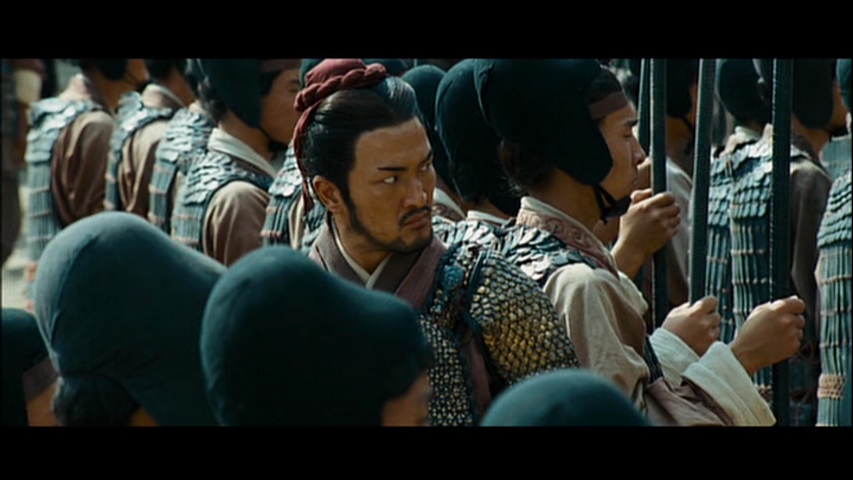 Still, it's fair to say that John Woo definitely has trouble dealing with the mundane, with scenes that don't include weapons/fighting/explosions/all of the above. As a result, his camera rarely stays still. Surely, the many trademark slow-motion sequences (when the screen doesn't freeze) and sudden zooms on the characters' faces might pass for a show of dexterity or even art, but honestly they are mostly distracting and are doing the slow-paced scenes a disservice by getting in the way of the narration instead of serving it. Only once does all that visual agitation actually give greater weight to a dialogue scene: when Zhuge Liang stands before Sun Quan and exposes his plan to him for the first time. There, the ballet between Takeshi Kaneshiro and Chang Chen, and the rapid changes of camera angles aptly reveal the characters' emotions, and particularly Sun Quan's turmoil and hestiations
Still, it's fair to say that John Woo definitely has trouble dealing with the mundane, with scenes that don't include weapons/fighting/explosions/all of the above. As a result, his camera rarely stays still. Surely, the many trademark slow-motion sequences (when the screen doesn't freeze) and sudden zooms on the characters' faces might pass for a show of dexterity or even art, but honestly they are mostly distracting and are doing the slow-paced scenes a disservice by getting in the way of the narration instead of serving it. Only once does all that visual agitation actually give greater weight to a dialogue scene: when Zhuge Liang stands before Sun Quan and exposes his plan to him for the first time. There, the ballet between Takeshi Kaneshiro and Chang Chen, and the rapid changes of camera angles aptly reveal the characters' emotions, and particularly Sun Quan's turmoil and hestiations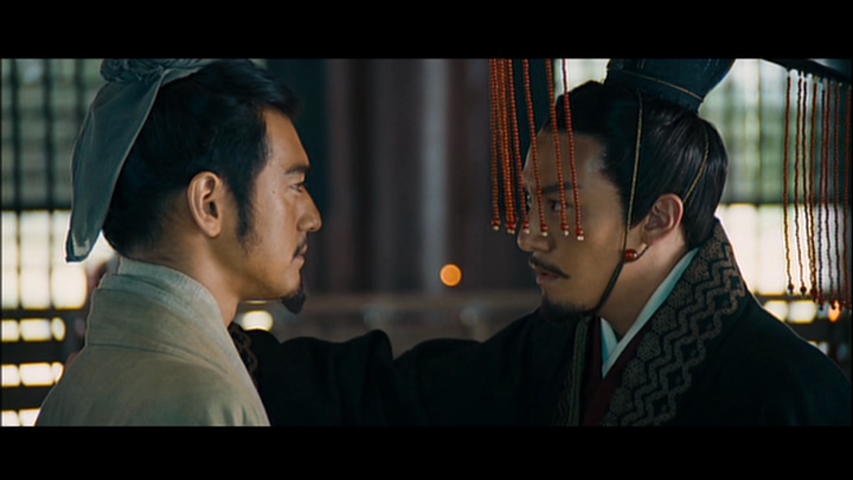 On the other hand, the beginning of that same scene with the arrival of Sun Quan in slow-motion into the room seen from Zhuge Liang's eyes is the first in a long list of cringe-worthy moments, mostly due to John Woo himself, who's always had this fetish for manly men bonding in the face of (armed) adversity and who is occasionaly guilty of letting it run away from him. Seriously, there are many occasions for man-bonding between the two movies, and that's often very well pulled off. On the other hand, it is very heavy-handed when scenes become mostly about the characters themselves. Of all, it is definitely Takeshi Kaneshiro's Zhuge Liang who is the biggest casualty and that's a shame because he's actually one of the two main characters in this narration of the Red Cliff battle (the other being Tony Leung's Zhou Yu) and, traditionally, one of the most beloved characters and certainly the one with the greatest intelligence and quick wit. Unfortunately, under John Woo's direction, all these qualities take a backseat to Liang's attraction to just about anything human that passes by, although he seems most enamoured with Zhou Yu and Sun Quan both, an attraction culminating in that pseudo-orgasmic expression in the middle of a scene which involves him and Zhou Yu playing music together which completely made me lose focus on the drama and instead made me wish that Woo would get the two of them in a room and get done with it already. I really don't mind a bit of ambiguity and homoerotism thrown in the mix, but either use it with moderation or be ready to go all the way. Someone please lend him a copy of "Aragami" - I never thought I would ever accuse Ryuhei Kitamura of doing "subtle", but that's exactly what he did when handling the undercurrent of attraction in his own man-to-man face-off
On the other hand, the beginning of that same scene with the arrival of Sun Quan in slow-motion into the room seen from Zhuge Liang's eyes is the first in a long list of cringe-worthy moments, mostly due to John Woo himself, who's always had this fetish for manly men bonding in the face of (armed) adversity and who is occasionaly guilty of letting it run away from him. Seriously, there are many occasions for man-bonding between the two movies, and that's often very well pulled off. On the other hand, it is very heavy-handed when scenes become mostly about the characters themselves. Of all, it is definitely Takeshi Kaneshiro's Zhuge Liang who is the biggest casualty and that's a shame because he's actually one of the two main characters in this narration of the Red Cliff battle (the other being Tony Leung's Zhou Yu) and, traditionally, one of the most beloved characters and certainly the one with the greatest intelligence and quick wit. Unfortunately, under John Woo's direction, all these qualities take a backseat to Liang's attraction to just about anything human that passes by, although he seems most enamoured with Zhou Yu and Sun Quan both, an attraction culminating in that pseudo-orgasmic expression in the middle of a scene which involves him and Zhou Yu playing music together which completely made me lose focus on the drama and instead made me wish that Woo would get the two of them in a room and get done with it already. I really don't mind a bit of ambiguity and homoerotism thrown in the mix, but either use it with moderation or be ready to go all the way. Someone please lend him a copy of "Aragami" - I never thought I would ever accuse Ryuhei Kitamura of doing "subtle", but that's exactly what he did when handling the undercurrent of attraction in his own man-to-man face-off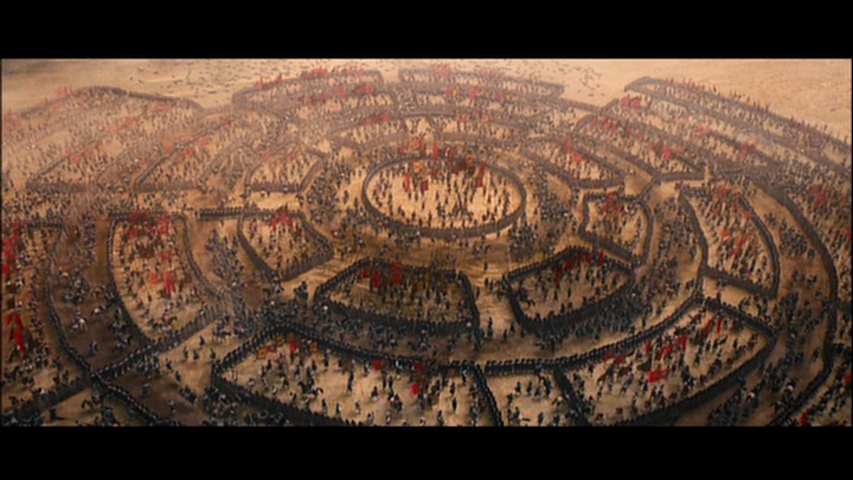 I know it's hard to believe based on what I've written so far, but actually I enjoyed Red Cliff Part 1 thoroughly and think it has a lot going for it. Firstly it is undeniably gorgeous, and unlike movies like "The Promise", the quality keeps up throughout. Also, while I can lament some artistic decisions during dialogue scenes, these only occupy the central segment of the movie, which is situated in between two battle scenes that are so beautifully shot that you would almost forget the military genius they illustrate. Because in many way, that's what the movie is all about. It is, first and foremost, a riveting battle of wits and agility between brilliant men. On one level, there are the strategists: Cao Cao against the minds of Zhuge Liang and Zhou Yu, who are in a sort of friendly competition among themselves as well (although the distant menace of a possible future conflict between their respective lords permeates the air and obviously weighs on their minds). To witness these minds at work, and to see how these ideas would translate on the field is riveting (and none more so than the set up to the "skirmish" that serves as a prelude to the actual battle of Red Cliff and which takes up most of the last hour of the movie)
I know it's hard to believe based on what I've written so far, but actually I enjoyed Red Cliff Part 1 thoroughly and think it has a lot going for it. Firstly it is undeniably gorgeous, and unlike movies like "The Promise", the quality keeps up throughout. Also, while I can lament some artistic decisions during dialogue scenes, these only occupy the central segment of the movie, which is situated in between two battle scenes that are so beautifully shot that you would almost forget the military genius they illustrate. Because in many way, that's what the movie is all about. It is, first and foremost, a riveting battle of wits and agility between brilliant men. On one level, there are the strategists: Cao Cao against the minds of Zhuge Liang and Zhou Yu, who are in a sort of friendly competition among themselves as well (although the distant menace of a possible future conflict between their respective lords permeates the air and obviously weighs on their minds). To witness these minds at work, and to see how these ideas would translate on the field is riveting (and none more so than the set up to the "skirmish" that serves as a prelude to the actual battle of Red Cliff and which takes up most of the last hour of the movie)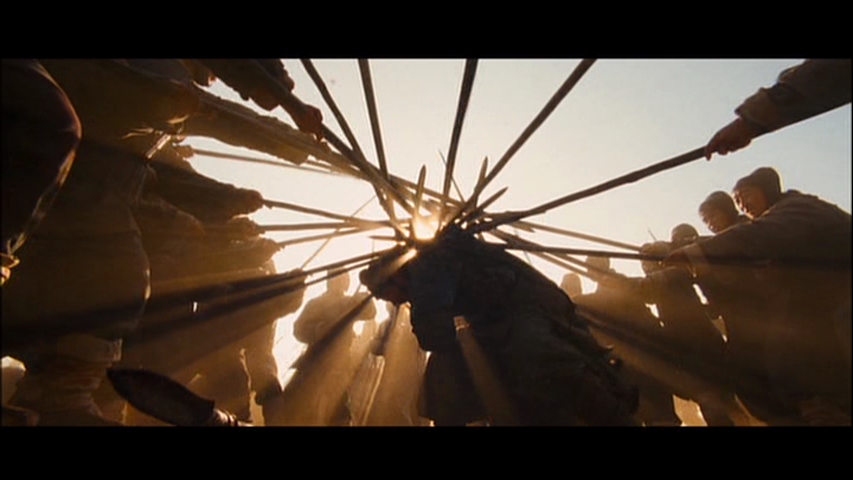 And then there are the actual battles, where the four generals (Zhao Yun, Guan Yu, Zhang Fei, all three sworn to Liu Bei, and Gan Xing, serving Sun Quan) are given time to shine. They have little impact on most of the events during the explanatory phase, which in a way isn't such a bad thing given the fact that it is the weakest part anyway, but they steal the show as soon as weapons are allowed to do the talking, not only because they are involved in some mouth-watering, breath-taking choreography and are, collectivelly, the more than welcome comic relief of the movie, but also because they plainly come across as fearless warriors on the battlefiled who are simply warm-hearted men when not fighting. I've certainly found myself cheering for them loudly in front of my tv screen on more than one occasion
And then there are the actual battles, where the four generals (Zhao Yun, Guan Yu, Zhang Fei, all three sworn to Liu Bei, and Gan Xing, serving Sun Quan) are given time to shine. They have little impact on most of the events during the explanatory phase, which in a way isn't such a bad thing given the fact that it is the weakest part anyway, but they steal the show as soon as weapons are allowed to do the talking, not only because they are involved in some mouth-watering, breath-taking choreography and are, collectivelly, the more than welcome comic relief of the movie, but also because they plainly come across as fearless warriors on the battlefiled who are simply warm-hearted men when not fighting. I've certainly found myself cheering for them loudly in front of my tv screen on more than one occasion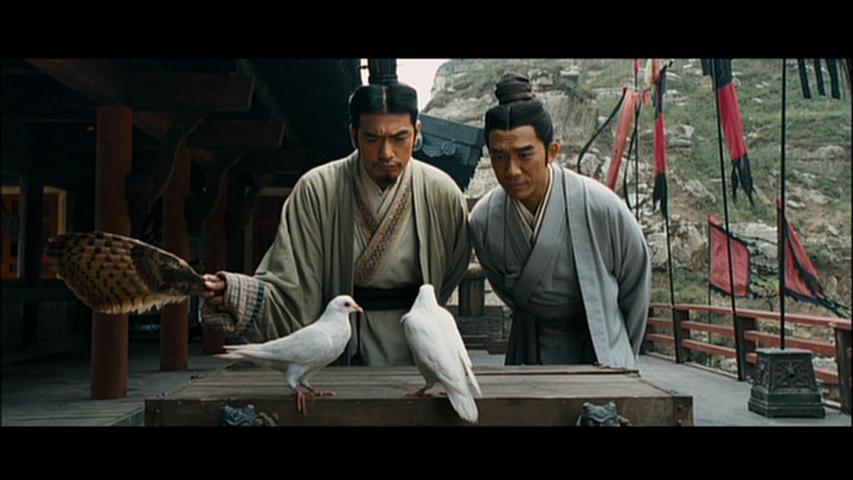 I don't know how people who usually have little interest with warfare as represented in movies will react to Red Cliff Part 1. I suspect though that having John Woo, who it seems has recovered his full mastery over just about anything cinema that involves movement is enough to keep even the most skeptical viewer riveted to their screen. At the very least, it does its job perfectly as an appetizer - a luxury, meaty one, mind you - for the "plat de résistance" that is Red Cliff Part 2. It definitely makes you want to see more, and preferably as soon as possible
I don't know how people who usually have little interest with warfare as represented in movies will react to Red Cliff Part 1. I suspect though that having John Woo, who it seems has recovered his full mastery over just about anything cinema that involves movement is enough to keep even the most skeptical viewer riveted to their screen. At the very least, it does its job perfectly as an appetizer - a luxury, meaty one, mind you - for the "plat de résistance" that is Red Cliff Part 2. It definitely makes you want to see more, and preferably as soon as possible